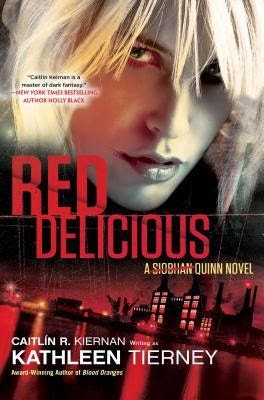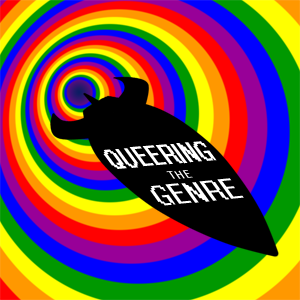Home » Posts tagged 'caitlin r kiernan'
Tag Archives: caitlin r kiernan
Agents of Dreamland by Caitlín R. Kiernan

A government special agent known only as the Signalman gets off a train on a stunningly hot morning in Winslow, Arizona. Later that day he meets a woman in a diner to exchange information about an event that happened a week earlier for which neither has an explanation, but which haunts the Signalman.
In a ranch house near the shore of the Salton Sea a cult leader gathers up the weak and susceptible — the Children of the Next Level — and offers them something to believe in and a chance for transcendence. The future is coming and they will help to usher it in.
A day after the events at the ranch house which disturbed the Signalman so deeply that he and his government sought out help from ‘other’ sources, Johns Hopkins Applied Physics Laboratory abruptly loses contact with NASA’s interplanetary probe New Horizons. Something out beyond the orbit of Pluto has made contact.
And a woman floating outside of time looks to the future and the past for answers to what can save humanity.
~~~~~
Tor.com, with books like Cassandra Khaw’s Hammers on Bone, Victor LaValle’s Ballad of Black Tom, and Ruthanna Emrys’ Winter Tide, have made something of a name for themselves as a home of good modern-day Lovecraftiana. Caitlín R. Kiernan, acknowledged master of horror writing, should be a great fit, then, and Agents of Dreamland is her turn to approach the formula.
Agents of Dreamland is something of an odd beast. It is perhaps the most true to Lovecraft of any modern-day Lovecraftiana: there’s a sense of horror at the strange, at the unknown; a sense of utterly inevitable, inescapable doom; a sense of total pointlessness in human attempts to stave off the end. At the same time, it’s much more of an espionage story than you might expect from Lovecraftiana; it’s very much in the mode of actual spy story, rather than just utilising government agents, with covert operations, covers, and interlocking international departments (think Charlie Stross’ Laundry series, but not pastiche). That gives it a strange sensibility that Kiernan executes really well, an odd atmospheric element that really does have impressive power to it.
Kiernan’s characters are part of that. There are three main characters in the novella; the Signalman, who is brilliantly hardworn, too-old-for-this not in the way of Top Gun but in the way of a man utterly worn down and beaten; there is Immacolata Sexton, a strange, unsettling presence in Agents of Dreamland, something other than human but working alongside and appearing to be human; and there is Chloe Stringfellow, naive devotee of a Lovecraftian cult with more than a hint of Manson to it. Each character is given a bit of a backstory, although not much, but they’re very distinct in their feel; the eternal age of Immacolata, the weariness of the Signalman, and the youthful enthusiasm and cultish devotion of Chloe are drawn very strongly, and suffuse their chapters powerfully.
The problem with the plot is one revealed about halfway through; Immacolata isn’t anchored in time, and goes to future events, that are inevitable. Agents of Dreamland doesn’t suffer from knowing that death, failure, and the coming of the Old Ones are inevitable; instead it suffers from demystifying that, making it far less strange and far more War of the Worlds than the rest of the book had it. Kiernan takes away from the creeping, creepy horror of the book to make it almost a straightforward alien invasion, that really doesn’t carry quite the punch it could do, because it’s so… understandable.
The other problem with this book is that it doesn’t really engage with the problems of Lovecraft. While the works mentioned in the opening paragraph challenge Lovecraft on one, or multiple, grounds of his bigotries, Agents of Dreamland just ignores them; arguably, indeed, by making a drug addict the only cultist we really meet, reinforces his absolute fear of the poor. Kiernan could have taken on Lovecraft’s prejudices by giving us characters of colour, or queer characters, or immigrant characters, or any number of other alternatives; instead, while not replicating the messages his stories sent, she doesn’t even think to challenge them either.
In the end, though, Agents of Dreamland does what it sets out to do: it is fanastically creepy and strange, and Kiernan has written a really unsettling novella.
If you found this review useful, please support my ability to write these reviews by contributing to my Patreon.
Black Helicopters by Caitlín R. Kiernan
Black Helicopters is Caitlín R. Kiernan’s first SF novella since 2004’s The Dry Salvages. Certainly one of her most ambitious tales to date, a narrative spanning one hundred and eighty-six years exposes a labyrinthine underworld of global conspiracy, secret societies, synchronicity, chaos theory, and interdimensional apocalypse. As a horrific plague unfolds on the shores of New England, two shadowy agencies are pitted against one another in a race to understand the consequences of a psychiatrist’s bizarre experiment involving a pair of albino twins. In this “game of chess,” even the most minute act sends infinite ripples through eternity, the struggle shaping the history of the future.
~~~~~
Kiernan is best known for novels like The Red Tree and The Drowning Girl – very queer, very strange psychological novels that focus on queer characters and encounters with the supernatural at the edges of sanity. The companion volume to The Ape’s Wife, Black Helicopters certainly deals with the edges of sanity, but it’s less markedly queer than those brilliant works.
This is a complex, slightly confusing novella; Kiernan jumps around in her timeline, revealing things and how they interconnect only slowly, allowing the logic of the story to unfold at its own pace and bending the mind of the reader while she does. Black Helicopters uses a chess motif an awful lot, and each chapter can be seen as another move in the game, drawing it towards a conclusion but at the same time in dialogue with the rest; that the focus alternates between the two different sides of the game heightens this impression.
The characters are surprisingly clearly drawn; Black Helicopters has a small but excellent cast of characters from Ptolema to Sixty Six, all very different, all somehow outside the cognitive mainstream, and some very far outside it. There’s a certain autobiographical element here, as Kiernan notes in the Acknowledgements; one of our viewpoint characters is a paleontologist, as Kiernan is by training. These are surprisingly extensively drawn characters for the short space Kiernan has available to tell us about them.
Black Helicopters may be confusing and strange, may verge on conspiracy theorism and Lovecraftiana, but is essentially a fun and strange novella with some brilliant ideas well worth your time.
Red Delicious by Kathleen Tierney
 Siobhan Quinn is back and working a new case in the dark and satirical sequel to Blood Oranges.
Siobhan Quinn is back and working a new case in the dark and satirical sequel to Blood Oranges.
Half-vampire, half-werewolf Siobhan Quinn survived her initiation into the world of demons and monsters. But staying alive as she becomes entangled in underworld politics might prove to be more difficult. When the daughter of a prominent necromancer vanishes, it’s up to Quinn to find the girl. But her search will land her directly in the middle of a struggle between competing forces searching for an ancient artifact of almost unimaginable power…
~~~~~
Demons, whorehouses, magical dildo macguffins, sideswipes at the rest of its subgenre… what’s not to like?
Caitlin R. Kiernan is best known for her dark, horror-skirting fictions like The Red Tree and the recent The Drowning Girl: A Memoir, beautiful, haunting, dark novels with unreliable narrators and a strong air of the Weird about them. The novels written under her open nom de plume Kathleen Tierney are similarly unreliably narrated, but with more of an air of the fatalistic and satiric about them.
Openly and explicitly in dialogue with the genraic tropes of urban fantasy, especially the Vampire Diaries/Anne Rice/Jim Butcher model, Tierney’s protagonist-narrator is a widely-educated high-school dropout, with a past as a heroin addict (something she keeps falling back on as a metaphor for vampirism), a healthy dose of fatalistic cynicism (or cynical fatalism?) and a brilliantly foul mouth. As our protagonist, Quinn is a fascinating study in contradictions; occasionally breaking the fourth wall, sometimes removing all narrative tension in order to emphasise that self-awareness. Further, the asides can be a little heavy-handed; the idea that a high-school dropout could be educated is overemphasised, as is the metaphor of addict for vampire. The reliance on these ideas gets a little wearing after a while, making what was a fresh narrative voice in Blood Oranges wear a little thin by the end of Red Delicious.
That isn’t to say that the novel isn’t full of fun, though. Whilst the time-filling action sequences, more-annoying-than-useful sideplots (especially the child-molesting demon-slaying rage-filled ex-Catholic priest…) get slow and dull over the course of the 270 pages, and the tail-chasing failings of Quinn as a detective… or a motivated protagonist… do slow the novel significantly. The amusements of the satirising of the Urban Fantasy genre and the silly-cum-darkly humourous magical dildo the novel centres on draw the reader through what is, by virtue of its writing style, a breezy read, with a complex structure of nestled stories; indeed, that is the single true narrative trick of the novel that really nails it.
The middle portion of the novel is a short story, The Maltese Unicorn. It, like the rest of the novel, has UF and pulp sensibilities, but is written in a sufficiently different style to differentiate it from the main bulk of Red Delicious. This piece of virtuosity only makes the flaws of the rest of the novel stand in a sharper contrast; however, hanging the novel around this centrepiece does work well as a narrative form, and I applaud both the ambition and the achievement it shows.
In the end, then, despite the dildos, the whorehouses, the swearing and the satire, Red Delicious is a frustrating, if fast, read. One can see what it’s trying to do, but it doesn’t quite, for this reader, manage it.



